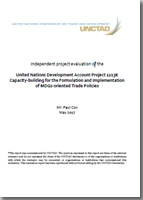
This Report has been prepared for UNCTAD in connection with the final independent evaluation of the United Nations Development Account (UNDA) funded Project 1213 AX titled: Support Developing Country Policy Makers in the Formulation of National Entrepreneurship Policies through the Implementation of Entrepreneurship Policy Frameworks.
Project implementation took place between June 2015 and December 2017 and was aimed at enhancing policy makers' capacities for the design and implementation of entrepreneurship policies. The project was implemented in six countries (Cameroon, Ecuador, the Dominican Republic, El Salvador, The Gambia, and the United Republic of Tanzania) and also included networking and knowledge-sharing activities involving stakeholders from these and other countries of the same regions.
The evaluation was conducted between December 2017 and March 2018 by an external evaluator. The general purpose of the evaluation is to assess the extent to which the project has achieved its above-described objectives. This exercise must support UNCTAD in ensuring ownership, result-based orientation, cost-effectiveness and quality of its assistance. More precisely, UNCTAD has defined the following evaluation objectives: to assess UNCTAD's work; to provide lessons learned; and to give feedback, appraisal and recognition, and to point out possible attribution of the program's achievements. In order to do this, the evaluation has responded to 19 questions grouped into 7 criteria.
Analysis of more than 100 diverse documents has been carried out. Also, the evaluation has drawn on censuses (rather than samples): representatives of all the leading partners in the beneficiary countries and all the UNCTAD staff involved have been interviewed (22 persons in total), and a survey was addressed to all the project participants (177).



